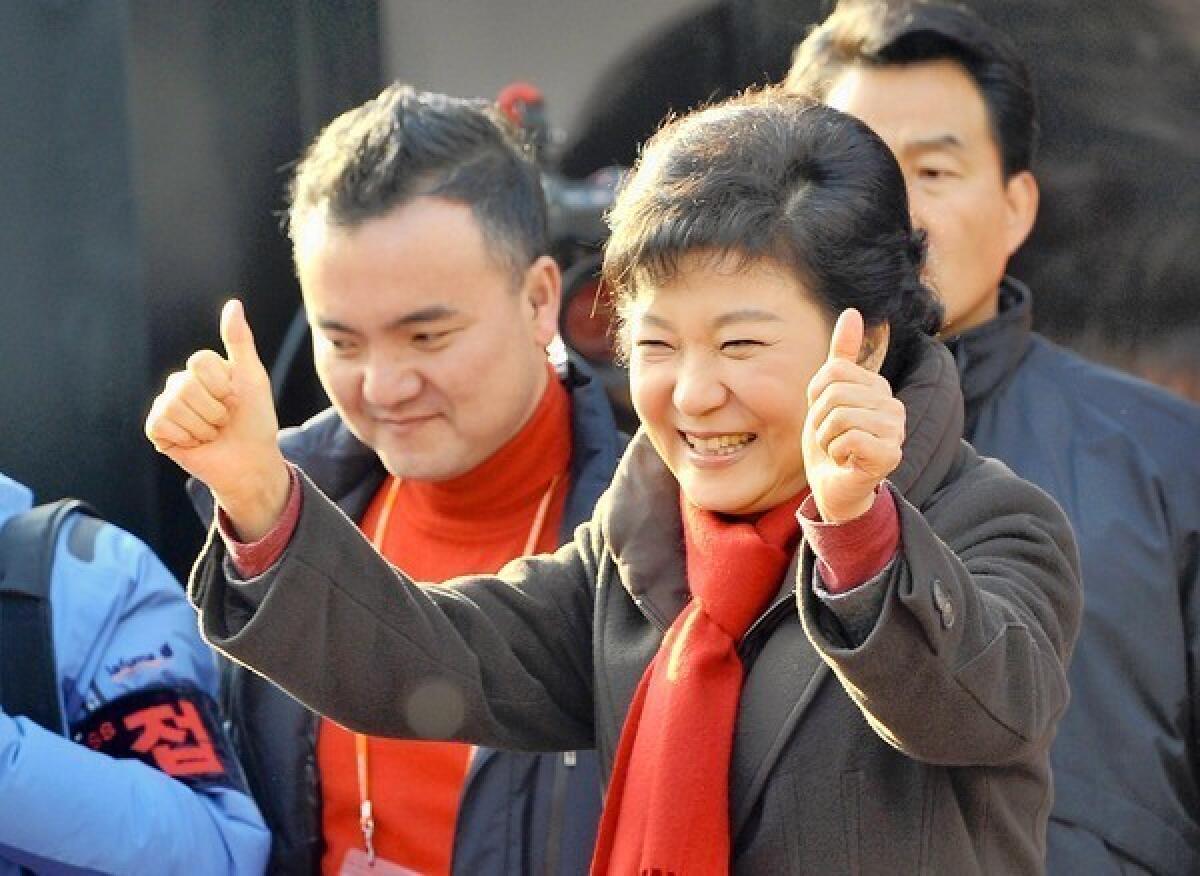Polarized South Korea could elect its first female president

- Share via
SEOUL — Park Geun-hye has been in the public eye since she was 9 years old, when her father took control of South Korea in a 1961 coup.
Half a century later, Park herself is a powerful political figure. In voting Wednesday, she stands a good chance of becoming South Korea’s first female president. Polls suggest her race with Moon Jae-in, a silver-haired labor lawyer, is neck and neck.
Some critics call Park, now 60, the “ice queen” for her lack of visible emotion in public. Elegant and composed, she never married — something that Koreans like because there is no spouse or children who can dip their fingers in the public till.
Moon was arrested and expelled from a university for a protest against Park’s father and later served as chief of staff to the left-of-center former President Roh Moo-hyun. But the election is less about Moon’s qualifications than the polarizing figure of Park.
To some extent, the election is a referendum on the divisive legacy of her father, Park Chung-hee. He is credited with the rapid industrialization that turned South Korea into one of the world’s wealthiest countries. But he also suspended the constitution and arrested and tortured student protesters. His security services tried to kill his opponent, Kim Dae-jung, who later became president and won the Nobel Peace Prize for his rapprochement with North Korea.
“I hate her so much that I have no choice but to vote for Moon,” said Lee Sang-gun, a 47-year-old magazine distributor who, as a university student, participated in pro-democracy demonstrations against the dictatorship of Park’s father. In his view, electing Park would be a step backward. “I feel this is a very critical time for Korean democracy,” Lee said.
In September, Park Geun-hye apologized for human rights violations committed during her father’s rule. “Behind the stellar growth were sacrifices by workers who suffered under a repressive labor environment,” she said. “I believe that it is an unchanging value of democracy that ends cannot justify the means in politics.”
Despite the ideological overtones, the campaign issues are mostly prosaic matters of jobs, the economy and social services. Moon has attacked Park as being too close to the chaebol, the huge conglomerates that dominate South Korea’s economy.
The candidates agree on the need to engage with North Korea, and whoever wins is likely to move away from the hard line adopted by conservative incumbent Lee Myung-bak.
Still, the electorate of this country of 50 million is deeply polarized along ideological and generational lines.
“This is like George W. Bush versus Al Gore. You have conservatives against liberals and the animosity between them is very strong,” said Hahm Sung-deuk, a professor of political science at Korea University.
Park has been one of the most visible public figures in South Korea for decades. As a young woman, she interrupted her studies in France in 1974 after her mother was killed by an assassin’s bullet aimed at her father. She served as de facto first lady until 1979, when the head of her father’s own security service shot and killed him.
She has been in the national assembly since 1998. The first time she ran for president in 2002, she was dismissed as just another in the long tradition of female Asian leaders who were trying to gain power on the coattails of a powerful male relative.
But with a decade more of experience under her belt, Park now is seen as a reassuring conservative, especially among older voters.
Although her campaign has tried to raise the energy level at her appearances with ear-splitting K-pop blaring from the loudspeakers — Park herself even tried a little “Gangnam Style” hand movement at one campaign appearance — the preponderance of gray hair is undeniable.
At a rally on the outskirts of Seoul last week in 15-degree weather, supporters in their 50s and 60s were bundled heavily with red scarves, the color of the ruling New Frontier Party.
“The world powers’ leaders are changing, and we need a president who has good judgment on national security issues,” said Lee Shin-baek, 64. He had come with friends who were enthusiastically waving red banners.
The night before, a basement-level coffee house was filled with a standing-room-only crowd including university students and professionals in their 40s who had gathered to watch the second of the presidential debates. Whenever Park spoke, they jeered and made catcalls at oversize television monitors.
“For many of the people in my family, they think Park Chung-hee was like a god and, of course, they are all supporting his daughter,” said Esther Kim, a 39-year-old insurance company worker.
“My uncle thinks that Moon Jae-in is a communist,” she added with a laugh. “I suppose he’ll say I’m a communist too if I tell him I’m voting for Moon.”
Park had been leading in the polls for most of the campaign, but the withdrawal of a third candidate, Ahn Cheol-soo, who endorsed Moon, has put the candidates almost even. The latest polls, which cannot by law be published in South Korea the week of the election, showed an even split — 45.2% each for Park and Moon, according to political scientist Hahm.
Hahm said the weather might be decisive. Cold is thought to favor Park because young people aren’t as politically committed as older voters and are less likely to turn out.
Special correspondent Jung-yoon Choi contributed to this report.
More to Read
Sign up for Essential California
The most important California stories and recommendations in your inbox every morning.
You may occasionally receive promotional content from the Los Angeles Times.













